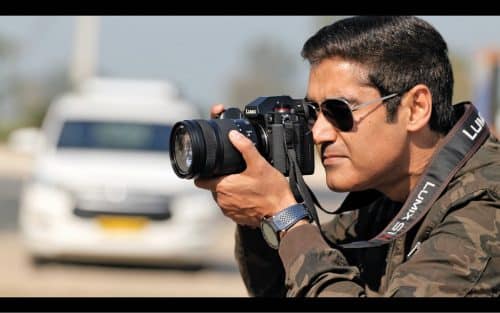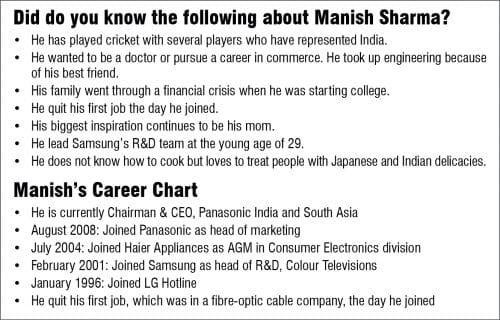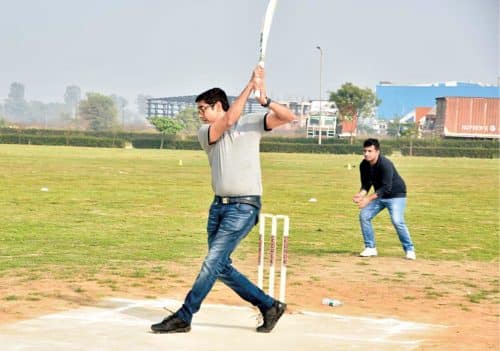He is followed by everyone in the electronics industry. He plays outstanding cricket and implements the learnings from the game into his leadership style. He headed Samsung’s R&D for TVs in India at the age of 29. His first job offer was a sum of consistency and perseverance that he showcased. He interviews India’s top political as well as non-political leaders. He writes about lessons from his life. He is currently leading Panasonic’s India and South Asia team from the front foot. This is Manish Sharma’s story as told to EFY’s Mukul Yudhveer Singh.

Born in Birla Nagar (Gwalior), Madhya Pradesh, Manish Sharma refers to himself as someone who has been blessed with good people throughout. In fact, he has an amicable nature and the knack of developing relationships. He does not shy away from admitting that he learnt the importance of developing good relations at a very early age. He learnt this and many other things from his father who worked in the Birla Group and his father’s elder brother who was president and a director in Birla Group.
“When I was growing up, I had really good friends. I think a lot of people would be able to relate with me and agree that genuine friendships are made in the initial stages of your life. You tend to become more practical when you start growing up and you are then not able to do justice to deep rooting your relationships. The childhood friends are pretty deep rooted in your life, and so is the case with me,” he recalls.
Manish completed his schooling from Carmel Convent School in Gwalior. A typical day for Manish would end by 8.00 PM, while the mornings used to be a little early. He is never late for meetings, events, or anything that he has committed time to.
“A typical day at school was full of action. You go to school, come back, finish your homework, and go out to play. The TVs were not there so we had a lot of physical activities on our hands. Weekends were filled with activities like picnics. That was a different era altogether as there was very low penetration of things like TVs and internet,” he shares.
Manish has been fascinated with the world of electronics since his school days. He remembers how electronics was a major inspiration for many in the city of Gwalior; many had heard about electronic goods but only a few had experienced them physically. Manish was so fascinated with electronics that he designed a lift for a school exhibition.
“I was very fond of seeing the repair guys seated in one corner of the showroom. One of the reasons for my fondness was magnets. When speakers get repaired, you get magnets out of them. I would use those magnets for a variety of purposes,” he recalls as he walks down the memory lane.
Manish, in the process of growing up, has lost some friends, made new ones, and learned about life. The challenges he has faced in his early schooling days include getting up at 4.30 in the morning and running to preparation classes for engineering colleges and universities. One of the finest skills that Manish has developed over time is how to resonate with others. When asked how one resonates with others, he answers, “It is a combination of natural talent and how you groom that talent. The same is true for leadership also.”
He adds, “In my case I did not participate much in stage shows or debates during my schooling years. If I try to relate my life today with my school life, I would like to be on the stage to talk to people. People can develop skills over time. Some of these skills are already there, and these just need a trigger, others are learned over time.”
Manish’s uncle (father’s elder brother) was president with the Birla Group. Manish spent a lot of time with his uncle and learnt a lot of leadership and relationship lessons from him. “He had a specific aura around him. I got several chances to spend a lot of time with him once he retired and started living in Delhi. I was able to relate a lot with his experiences of life,” he says.
An avid reader, Manish has read loads of books, and is of the view that books can inspire people in many ways. Not a big fan of fiction, he enjoys reading autobiographies, books on philosophy and life the most. Manish also enjoys reading the work of Panasonic’s founder Konosuke Matsushita.
“When it comes to autobiographies, I think both the Steve Jobs autobiographies will inspire you a lot. The movie on Steve is good but I think it does not do justice to the challenges faced by the legend, whereas the book is much more detailed about the same. Then a basic book like Ikigai can teach you a lot. I have read Alchemist many times,” he shares.
So, who have been the biggest inspirations for Manish Sharma? He answers, “My mom, dad, and dad’s elder brother.”
Manish’s mother is an intelligent lady who thinks much ahead of time, and is liberal, empowering, and characterful. She would give space yet draw guardrails and inculcate value systems rather than telling things directly. She is the lady behind the strong value systems that got inculcated in her children. It lets them still keep their heads stable, irrespective of what the environment is. “My mother is still the biggest inspiration for me,” he says proudly.

Cricket, life, leadership
Manish was 11 when India’s legendary Kapil Dev lifted the first cricket World Cup ever won by the country. While the moment was as inspiring for Manish as for every Indian, this was also the time when his family owned a TV set for the first time.
“We were trying our hands at many sports including swimming, tennis, billiards, table tennis, cricket, and a lot more. As it happens, cricket is a religion for almost everyone in the country. The year 1983 was the time when me and millions of other Indians found inspiration in cricket. It was also the time when TVs had started coming into the town I lived in,” recalls Manish.
Manish’s maternal uncle had an electronics showroom in Gwalior, and the man who drives Panasonic India today never missed a chance to visit the same and try his hands at selling electronics. The year 1983 was a time when consumer electronics like TVs had just started making their journey into towns like Gwalior.
“My mamaji used to be a leading retailer of electronic goods in Gwalior, and he was amongst the top few in the country. He was not just retailing products from top consumer electronic brands but was also getting radios manufactured locally. I, on weekends, used to go to the showroom owned by him and try selling products like Murphy radios, Philips radios, Ahuja public address systems, and lots of other things,” he shares.

“I do remember the nostalgic moment when Kapil Dev took that memorable catch of Vivian Richards. The TVs back then were all about showing hazy pictures, but that moment become inspiration for millions of people like me. I picked up a coffee-table book, which had photos of the Indian cricket team and their World Cup moments,” he recalls.
The days following the 1983 World Cup were filled with Manish playing cricket. Manish does not refer to himself as a good player but says he was lucky as he was able to score for the teams he played with when it mattered the most.
And what’s playing all these sports has enabled Manish to do? “I am a jack of all trades and master of none. I can try my hand in almost any sport, but I am a master of none,” he says.
A look at his professional innings and one realises that the man who is chairman of Panasonic India and South Asia is actually a master of overseeing strategy planning and business development for Panasonic. A closer scrutiny and you will find that Manish has worked in front-end operations, headed R&D, has been the chief of marketing and sales, and has worked on business development.
To add cherry to the cake, he is a prolific writer, one who shares his experiences around leadership and a lot of other things on Linkedin. He also has a Youtube channel named Duologues where he interacts with public figures around leadership lessons. His conversation skills, and skills that make him resonate with the majority, or the right target audience, have probably played a big role in what he has achieved today.
“Cricket is by far the sport that I love to follow the most. It has so many learnings. I have seen that people who have committed themselves to the game and respect the game have done extraordinary. Whereas no matter how committed one is towards the game, but does not respect the game, ends up doing ordinary things,” he says. The game of cricket, as he shares, teaches a lot of leadership and how one can react in tough times. He is of the view that a lot of people in India learn their first leadership lessons through the game of cricket.
“Every individual is a sum total of people around. I think this is one of the biggest learnings that come from the game of cricket. It takes one ball to take a wicket and one ball to lose or win a game. On the other hand, there are so many overs, and in test matches so many days available. Cricket has taught me that life is not a sprint, it is a marathon. Cricket teaches us when to live life like a marathon and when to live it like a sprint,” he shares.
He adds, “Cricket teaches you to adapt in accordance with changing times and situations. Life is like that, you cannot live life like a sprint. All the three formats (T20, One Days, Tests) have different learnings. You have to continuously imagine, plan, adjust, think, and then execute.”
College and financial crisis
When you get born in an established family and are given almost everything a child can dream of in school days, you quickly draw assumptions about how cool your life is going to be once you join a college for higher studies. But this was not the case with Manish.
Please register to view this article or log in below. Tip: Please subscribe to EFY Prime to read the Prime articles.






